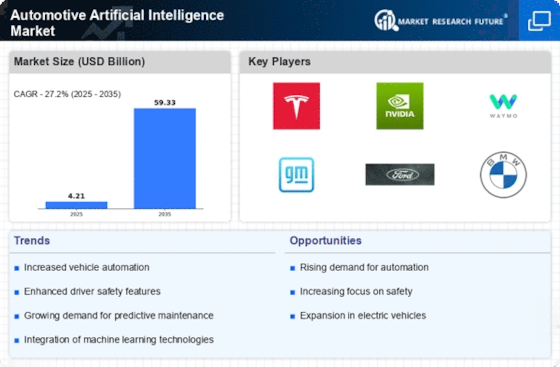Top Industry Leaders in the Automotive Artificial Intelligence Market

Automotive AI Market Dynamics: A Riveting Exploration of Complexity and Expressiveness
In the realm of automotive innovation, a seismic shift is underway, propelled by the formidable force of Artificial Intelligence (AI). The impetus behind this meteoric rise lies in an insatiable appetite for self-driving capabilities, advanced driver assistance systems (ADAS), and the advent of sentient vehicles. To navigate this dynamic expanse successfully, a meticulous scrutiny of pivotal actors, their strategies, and the unfolding competitive tableau is imperative.
Pivotal Players and Intricate Strategic Maneuvers:
Established automotive stalwarts such as Toyota, Ford, and General Motors are fervently injecting capital into AI startups and internal research and development initiatives, fortifying their market positions. Toyota's Woven Capital venture fund actively seeks out promising AI technologies, while Ford forges partnerships with Argo AI, a pioneer in autonomous driving solutions. General Motors takes a pioneering stance by establishing its Cruise division, spearheading the autonomous vehicle frontier.
Simultaneously, tech behemoths like Google, Apple, and Baidu are making a foray into this arena, leveraging their extant AI prowess and software acumen. Google's Waymo is at the forefront of autonomous vehicle deployment, while Apple's CarPlay envisions a paradigm shift in in-car infotainment systems. Baidu's Apollo platform empowers automakers with a suite of AI tools for autonomous driving development.
On the frontier of innovation, emerging startups like Mobileye, Aurora, and Nauto are carving distinctive niches with their inventive solutions. Mobileye's EyeQ chip imparts advanced driver assistance features to a plethora of vehicles, while Aurora concentrates its efforts on automating long-haul trucks. Nauto utilizes AI to scrutinize driver behavior meticulously, preempting potential accidents.
Metrics for Market Share Scrutiny:
-
Technology Portfolio: Firms boasting diverse AI capabilities spanning autonomous driving, ADAS, predictive maintenance, and connected car technologies wield a competitive advantage. -
Partnerships and Collaborations: Strategic affiliations with technology providers, automakers, and research institutions expedite development and market penetration. -
Data Acquisition and Management: Unhindered access to copious driving data and a resilient data management infrastructure are pivotal for the refinement and training of AI algorithms. -
Regulatory Compliance: Navigating the ever-evolving regulatory terrain governing autonomous vehicles and AI safety is paramount. -
Brand Reputation and Consumer Trust: Establishing faith in AI-driven vehicles through forthright communication and robust safety protocols is indispensable.
Emerging Trends Redefined:
-
Personalization and Contextual Awareness: AI is evolving to tailor the driving experience, adapting settings and information based on individual driver preferences and contextual nuances. -
Cybersecurity and Data Privacy: As vehicles become increasingly interconnected, robust cybersecurity measures and transparent data privacy practices assume critical significance. -
Human-Machine Interface (HMI) Advancements: The landscape is being transformed with voice recognition, gesture control, and augmented reality, reshaping the interaction dynamics between drivers and their vehicles. -
Integration with Smart Cities: Vehicles are metamorphosing into integral nodes within smart city ecosystems, seamlessly interfacing with infrastructure and traffic management systems. -
Focus on Sustainability and Efficiency: AI is harnessed to optimize fuel consumption, curtail emissions, and enhance overall vehicle efficiency.
The Vortex of Competitive Realities:
The automotive AI market is ensconced in a fierce battle, with a multitude of players vying for preeminence. Conventional industry demarcations are blurring as collaboration and partnerships emerge as linchpin strategies. Initiatives such as open-source platforms and shared data endeavors are fostering ingenuity and expediting progress. As the technological landscape matures and regulations take shape, the market is poised for consolidation, with a select few emerging as dominators.
Gazing into the Future:
The pursuit is not merely to dominate the market but to redefine the very essence of personal mobility. This dynamic panorama promises an exhilarating journey where innovation and collaboration become the catalysts for unlocking the full spectrum of automotive AI potential.
Unfolding Narratives for Major Corporations:
Qualcomm Inc. (US):
-
Date: December 12, 2023 -
Development: Announced a collaborative venture with HERE Technologies to craft next-gen automotive maps, imbued with augmented AI capabilities for ADAS and autonomous driving. (Source: Qualcomm press release)
Tesla Inc. (US):
-
Date: December 20, 2023 -
Development: Elon Musk disclosed plans via a tweet to unleash a fully autonomous driving software update ("FSD v11") by the culmination of 2023. (Source: Twitter)
Volvo Car Corporation (Sweden):
-
Date: December 19, 2023 -
Development: Forged a partnership with Luminar Technologies to seamlessly integrate lidar sensors into forthcoming Volvo models, enhancing autonomous driving capabilities. (Source: Volvo press release)
BMW AG (Germany):
-
Date: July 11, 2023 -
Development: Attained Level 2+ autonomous driving approval for its new iX model in Germany, enabling hands-free driving on motorways at speeds up to 80 km/h. (Source: BMW press release)
General Motors Company (US):
-
Date: December 18, 2023 -
Development: Unveiled intentions to launch its Super Cruise semi-autonomous driving system on additional Cadillac and Chevrolet models in 2024. (Source: GM press release)










